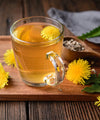Recent Post
What Is A Tea Estate And Why Their Story Should Matter
Luxmi Estates
Jan 13, 2023
As tea drinkers, we have become increasingly tuned into the story of our consumption - wanting to know where our food and drink comes from, how it was grown, and whether fair practices were used that benefit the environment and humanity alike. If you consider yourself a regular tea drinker, you should be invested in what a tea estate is and why it is essential to your tea's quality.
What Is A Tea Estate
A tea estate is any land used for a tea plantation that also includes a place to process the harvest. Tea Estates can retain hundreds of years of agricultural history and tradition. They are living heritage sites that can house entire family histories and generational families of workers. Their rolling hills and rivers showcase the loving protection of their caretakers over pristine swaths of land in countries like India, China, and Sri Lanka.
Tea Estates take special care in maintaining the health of the soil and surrounding water resources that feed into the plantation, making them environmental stewards and tea harvesters. A premium tea estate like one of India’s oldest, Makaibari, holds the harmony of the land as its highest priority versus a large-scale factory whose primary goal is to produce in masse as quickly as possible.

Photo: Luxmi’s Verdant Addabarie Tea Estate
Why A Tea Estate’s Story Should Matter
Tea sourced from a pristine and storied Tea Estate has a different level of taste and quality. A responsible tea estate also takes great care in investing in the harvest area's environment, including the natural resources and wildlife. In addition, there are many social measures in place to ensure that fair working practices are in place and can alleviate poverty by supporting the economy of small farming towns. Tea Estates play a prominent role in the harmonious development of the economy and environment of the pristine locations they are grown in.
In addition, tea estates value a high-quality small-batch harvest that moves with the harmony of the environment rather than chemically induced high-yield mass production harvests.
When you buy from a Tea Estate, you buy tradition, quality, and the harmony of the environment the tea was raised in.

Photo: Harvesting at Luxmi’s Makaibari Tea Estate
Luxmi’s Tea Estates
Luxmi was founded in 1912 out of a patriotic quest. Paresh Chandra Chatterjee planted his first tea bush to support the self-reliance movement - by supplanting British Tea with a sprinkling of "Indian Tea". Tending to the first fragile saplings, planting on virgin soil, channeling the stream, plucking the leaf - we have, literally, built estates from the ground up and turned around properties from sickness to health.
Thousands of hectares have been planted and replanted by the Luxmi management and workers over the past century. Today Luxmi tea has ten factories and 17 tea estates in Assam and Northeast India. Tea production has grown from 100 thousand kilograms to 15 million kilograms. Luxmi’s luxury tea estates in India have hundreds of years of history and fertile soils.
Different Luxmi gardens produce different flavors for different markets; the tea produced and sold is the pride of tea growing in India and is now available internationally.

Photo: Luxmi’s Makaibari Tea Estate
Verdant Addabarie Tea Estate
The beautiful Verdant Addabarie Tea Estate is home to not only well-manicured tea bushes and tall shade trees they share the landscape with free-roaming elephants and rhinos. Life thrives in biodynamic harmony here as the earth folds into soft undulations in the Sonitpur district.
Addabarie has folk legends that throw light on its unusual name. The first legend traces back to wild ginger or 'adda' that once grew in abundance in the gardens. ‘Barie’ means field, which has now become the estate that grows tea with the same abundance.
Makaibari Tea Estate
Set on the steep slopes of Kurseong, this biodynamic estate produces a rare, cosmic tea harvested on full moon nights as the planets align. The renowned Makaibari Estate is the world's first tea factory, established in 1859. They consider their farmers as agricultural artists, where their palette is the earth, and they create their paintings with various seeds and animals to produce food that sustains humankind.
This estate uses a biodynamic method, which has evolved a uniquely healthy soil, coupled with permaculture, to usher harmony between soil, microorganisms, plants, animals, and man.
Harmonious interactions at all stages have created a bio trope for many species of animals to thrive here, including endangered panthers, tigers, birds, butterflies, snakes, spiders, and many others, feeding off of each other as part of the natural food chain.
Makaibari retains 70% of its entire area under forest cover. Makaibari follows a form of integrated forest management utilizing permaculture where the tea bush is part of a multi-tier system of trees and plants typical of a sub-tropical rainforest, as opposed to a monocultural farm that grows only one crop.
Read more about the magical stories of Luxmi’s other pristine tea estates here.
← Older Post Newer Post →




